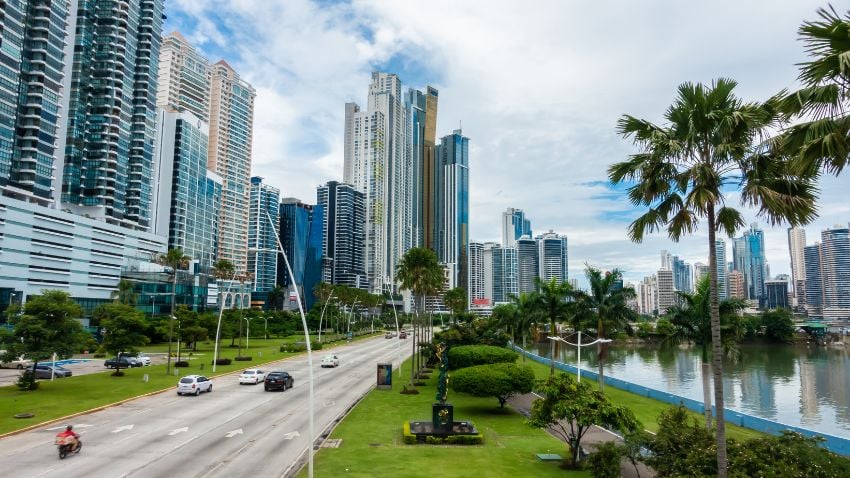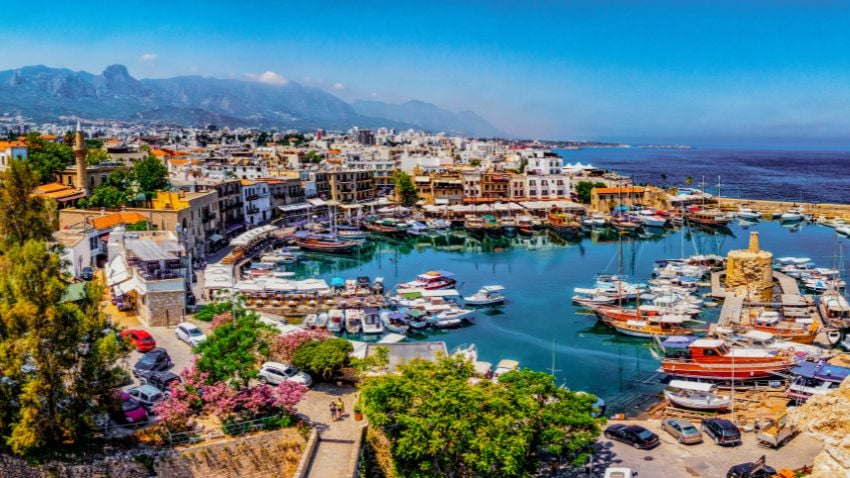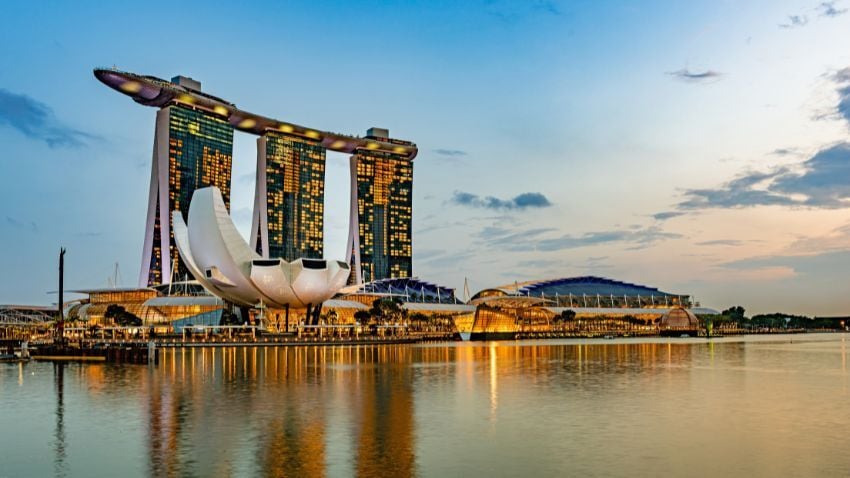Living In Singapore: Pros & Cons You Should Know
Singapore is often described as a city that works, and it totally deserves its reputation. This small island nation in Southeast Asia has built one...

6 min read
After the last couple of years, you might have felt trapped within the confines of your home country. In most of the Western world, liberties have been restricted like never before, while taxes and the cost of living have skyrocketed.
However, with the proper procedures and knowledge, you can escape those limitations and start a new life of freedom and prosperity. In my blog, I have covered financial tools such as trusts and foundations and Citizenship By Investment (CBI) programs that could help you make the most of your wealth.
In this article, we will dive deep into the world of tax havens and offshore jurisdictions and how they can offer unparalleled financial and lifestyle opportunities. If you want to take advantage of this, discover these two pathways to secure your new life abroad.

In essence, a tax haven is a jurisdiction that offers individuals and businesses tax and privacy advantages
The mass media and many socialist-leaning politicians love demonizing tax havens and those who use them to protect their wealth. Most people don’t know that it’s perfectly legal for individuals and businesses to choose tax havens as tools to secure their financial well-being.
Contrary to popular belief, the allure of tax havens is not based on illegal activities but rather on the possibility of legitimate and lawful financial growth and protection.
Given the controversy around this term and the ever-changing minds of some organizations like the European Union (EU), it's hard to determine what a tax haven really is.
However, at its core, a tax haven is a jurisdiction that provides individuals and businesses outstanding advantages in terms of tax benefits and financial privacy, including banking secrecy. It can also be described as a place where taxes are low or non-existent, favouring the reduction of tax obligations and the retention of a significant portion of one’s income and wealth.

Not declaring income is illegal, but operating in tax havens and paying low taxes is not. Very valuable knowledge for expats
A tax haven goes beyond a place where you can pay less taxes. It’s a whole jurisdiction that encapsulates a particular set of advantages to attract expats and individuals seeking financial and privacy benefits. Let’s explore them:
This is, by far, the most common trait of tax haves and the reason why expats go abroad. Some countries have massive GDPs, but the more developed they are, the more they tend to tax the wealth generated within their borders.
As of the time of writing, countries like the US have a 37% maximum federal tax rate. And some States, like New York, have an additional maximum state income tax of 10.9%.
While Western countries often come with conveniences like infrastructure and business opportunities, some individuals prefer establishing their businesses in tax havens. In particular, many corporations’ subsidiaries are headquartered in these places, and so are online businesses with a substantial income.
Let’s be honest here.
You probably know some local businesses or regular people who get paid in cash to avoid taxes and improve confidentiality. While this might be a good option for some, it’s very risky, especially if tax authorities go after them.
Not declaring your income is illegal, but operating in tax havens and paying little tax is not. That’s why, as an expat, this knowledge is extremely valuable for you.
Technological advancements have raised awareness of data privacy, so tax havens come into play by offering over-the-top privacy measures to protect assets. Tools like blockchain and certain regulations facilitate data security and transparency, allowing individuals to safeguard their information while complying with global regulatory standards.

Tax havens move in the opposite direction of countries that inflate the size of the State and make it difficult to open companies
While some countries increase the size of the state and make it difficult to start a business, tax havens are the complete opposite. Even though each jurisdiction offers its own set of regulations, they’re all dedicated to creating business-friendly environments to boost their economies and help ambitious individuals thrive.
If you want to relocate your business or even start a new one, a tax haven can help you thanks to its simplified registration procedures and reduced reporting requirements. In other words, the tax codes in these jurisdictions tend to incentivize entrepreneurship and innovation.
After dealing with annoying regulations in your home country, the thought of going abroad to focus on your business and not dealing with monstrous bureaucracies might often cross your mind.
Fortunately, a tax haven will not require you to explain yourself day in and day out as if you were committing a crime just for making money.
If everything you’ve read so far sounds good, now it’s time for a list of tax havens:
Isle of Man;
Hong Kong;
The Channel Islands (Jersey, Guernsey, Sark).

An offshore jurisdiction is a territory or country that provides a legal and financial body to attract foreign investment
As mentioned in the previous section, certain individuals and organizations demonize those who put their wealth in other places where they get more tax benefits. The truth is that the underlying agenda is simply to keep people under the thumb of the state and their cronies so that they can control not only people’s money but also their behaviour.
Fortunately, offshore jurisdictions are a great bastion of freedom that can offer plenty of opportunities to you if used right.
An offshore jurisdiction is a country or territory that offers a legal and financial infrastructure designed to attract foreign investments. It serves as a gateway to a realm of economic opportunities, asset protection, wealth management, and cross-border transactions. In essence, it provides individuals and businesses with a framework of minimal or no government intervention, making business operations more convenient and comfortable.
Relevant article: The Basics Of How To Get A Second Passport Or A Second Residency

A foreign company can move to an offshore jurisdiction and minimize its tax liability completely legally
The main features of an offshore jurisdiction are similar to a tax haven, but the main difference is that only offshore businesses benefit from them.
To make this difference more clear, here’s an example. If you were born in Canada and moved to Dubai, you would benefit from a 0% personal income tax rate. If you relocate your business to an offshore jurisdiction, you could benefit from lower taxes than local businesses. Let’s explore the main features.
This is, by far, the most common reason why companies go offshore. A foreign company can relocate to an offshore jurisdiction and legally minimize its tax liability. In fact, they get reduced tax rates while local businesses have higher ones. Some examples are reduced capital gains or corporate taxes, which result in cost savings and bigger profits.
Offshore jurisdictions allow businesses to establish international holdings, which are conglomerates of multiple companies in various jurisdictions. This enables businesses to operate in various markets, craft an improved tax strategy, and manage their assets and liabilities more comfortably. Since it’s possible to operate in multiple countries, it’s harder for greedy governments and organizations to seize profits and assets. In simple terms, this enables one to put one’s eggs in various baskets.
Offshore jurisdictions facilitate cross-border transactions, thus simplifying trade with international suppliers and clients. Plus, these jurisdictions offer better banking services, loan terms and financing.

Citizens of these countries use offshore jurisdictions to protect themselves against seizure of assets and ideological persecution
Individuals and businesses can use an offshore jurisdiction’s strict regulations to preserve their own personal and corporate information, thus preventing undesired disclosure. This helps maintain privacy in financial affairs and protects sensitive information from lawsuits and creditors. On top of that, there are simplified financial and tax reporting requirements, which reduce the administrative burden and compliance procedures.
This benefit is also crucial for entrepreneurs from corrupt countries. Citizens from such countries can use offshore jurisdictions to protect themselves against the seizure of assets and ideological persecution.
Now that you know some of the features, let’s check some jurisdictions:
Hong Kong;
Delaware (US State);
Ras Al Khaimah (UAE);
These two legal and financial frameworks are often associated with illegal activities. Still, the majority of legal persons who use them have legitimate purposes, such as asset protection and tax optimization.
Furthermore, it is crucial to recall that while there is a favourable regulatory framework that guarantees ease of doing business and solid protection against lawsuits, it’s equally important to know the legality and compliance procedures of each jurisdiction. Organizations like the OECD, the FATF and the UE work towards setting international standards and transparency to prevent terrorism and money laundering.

With adherence to legality, individuals can take advantage of tax havens and offshore jurisdictions to ensure their prosperity
Tax havens and offshore jurisdictions offer individuals and businesses unique legal and financial advantages. Despite misconceptions, these frameworks provide opportunities for tax optimization, asset protection, and simplified financial operations. Tax havens, such as Bermuda, Singapore, and the UAE, offer low or no taxes, confidentiality, and minimal financial regulations.
Offshore jurisdictions, like Panama and Hong Kong, provide reduced tax liabilities, asset protection, and ease of cross-border transactions. Addressing myths associating these frameworks with illegal activities is essential, especially because multiple organizations actively persecute those who misuse these jurisdictions.
Finally, compliance and understanding international standards are crucial. With careful consideration and adherence to legality, individuals can leverage tax havens and offshore jurisdictions to secure financial prosperity.
If you want the best intel from the expat world, including profitable offshore opportunities, little-known tax-saving strategies, and hard-won insights on immigration, passports, and Plan-B residencies, all delivered to your inbox every single week, then join our daily correspondence, EMS Pulse®. Currently enjoyed by over 84,000 expats and expat-hopefuls worldwide. Fill in the form below to join our newsletter free:

Written by Mikkel Thorup
Mikkel Thorup is the world’s most sought-after expat consultant. He focuses on helping high-net-worth private clients to legally mitigate tax liabilities, obtain a second residency and citizenship, and assemble a portfolio of foreign investments including international real estate, timber plantations, agricultural land and other hard-money tangible assets. Mikkel is the Founder and CEO at Expat Money®, a private consulting firm started in 2017. He hosts the popular weekly podcast, the Expat Money Show, and wrote the definitive #1-Best Selling book Expat Secrets - How To Pay Zero Taxes, Live Overseas And Make Giant Piles Of Money, and his second book: Expats Guide On Moving To Mexico.

Singapore is often described as a city that works, and it totally deserves its reputation. This small island nation in Southeast Asia has built one...

Panama’s geographic size is modest, but its global relevance is not. The country connects two oceans and two continents, operates on a dollarized...

Honduras’ newly elected president, Nasry Asfura of the conservative National Party, was sworn in on January 27, 2026. The election, held on November...